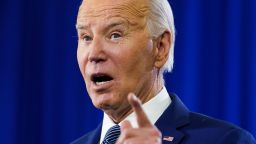Joe Biden’s Democratic base has been divided over the Israel-Hamas war. The public, at large, gives the president some of his worst approval ratings over his handling of the conflict.
To some, including people within Biden’s own party, the public demonstrations against the war in Gaza remind them of the Vietnam War protests. To others, it’s a reminder of what they saw in the 1980s with the anti-apartheid movement against South Africa’s White-led government.
But of all the problems Biden has to deal with as he seeks reelection, the war in the Middle East and the related divisions at home are not even close to being the top issue that will decide the 2024 election, according to recent polling.
Few Americans say they will base their vote off the Israel-Hamas war. A recent NBC News poll found that just 7% of voters said they would vote for or against candidates because of their stance on the war. That’s not anywhere close to the top three answers – protecting democracy or constitutional rights, immigration or border security, and abortion – chosen by between 19% and 28% of voters.
It was a similar story with a recent Gallup poll that asked Americans to name the most important problem facing the nation. A mere 2% answered with some version of the Israel-Hamas war (e.g., the Middle East conflict). That ranked 17th of all the answers given. Immigration was No.1 at 27%.
Even among those younger than 35, only 2% said that the Israel-Hamas war was the most important problem. The top problem for this group was inflation, at 16%.
An unpopular war
This is dramatically different from what we saw in 1968, when the Vietnam War forced President Lyndon Johnson to abandon his reelection bid. Back then, north of 40% of Americans regularly said that Vietnam was the most important problem. No other issue came anywhere close to being rated as high.
The final Gallup poll to ask the question before the 1968 election showed 44% listing the Vietnam War as the most important problem, including 45% of those younger than 35.
Now we should mention that there were American troops on the ground during the Vietnam War, something that is not the case with the current Israel-Hamas conflict.
Still, given the low priority the war in Gaza is for most Americans, it’s not surprising that Biden’s overall job approval numbers are about the same as they were at the start of the conflict in October (about 40%).
Biden’s standing against former President Donald Trump, the presumptive Republican nominee, is also about the same as where it was in early October. The pair are basically tied nationally, with perhaps Trump slightly ahead, depending on how you aggregate the polls.
Biden, of course, does have a problem with younger voters, who are far more likely to disapprove of his handling of the Israel-Hamas war. If you average recent polling of those younger than 30 or 35, depending on the poll, Biden’s is well behind his 2020 showing. The final 2020 national polls had him ahead of Trump by about 29 points among younger voters. Today, he’s up by about 5 points, on average.
Only a small fraction of that polling decline can be attributed to Biden’s war response. I say that because the president’s problems with young voters were apparent before the war. He was up over Trump by about 11 points, on average, in polls taken immediately before the conflict erupted, which was still 18 points down from the final 2020 polls.
The risk of response
The election is close enough that any drop in Biden’s standing against Trump could make the difference.
But any attempt by Biden to satisfy younger voters could risk alienating the rest of the electorate. Although some have compared the campus protests with what we saw in the 1980s against South Africa’s apartheid government, the parallels aren’t evident in the polling.
Back in 1985, the sentiment about South Africa ran overwhelmingly in favor of its Black population, not the White-led apartheid government. When asked whom they sympathized with more, 64% of Americans indicated it was the Black South African population, an ABC News poll found. Just 13% picked the White government.
In the current conflict, more Americans sympathize with Israelis than Palestinians. A February poll from Gallup put the margin at 51% to 27%. A March poll from Quinnipiac put it at 43% to 30%.
Those younger than 35 are more likely to sympathize with the Palestinians by an average of 50% to 31%, which would line up with Biden’s small polling decline among this group since early October.
But this is a more equal divide than what we saw some 40 years ago. Sympathies ran 76% for the Black South African population to 10% for the White-led government among Americans under age 35, according to the 1985 ABC News poll.
On the whole, this leaves Biden between a rock and a hard place in the current Middle East conflict. He could take stances seen as more favorable to Palestinians, but he might lose voters who are more sympathetic to Israelis. Or he could stay the course and continue to bleed support among younger voters.
The bottom line is that, like many things about the 2024 election, it’s not going to be easy for Biden to defeat Trump.







